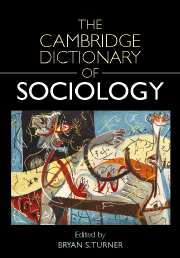How to use this Dictionary
Published online by Cambridge University Press: 22 October 2021
Summary
Sociology is a critical discipline, and its concepts are typically contested. There is no consensus over the meaning of globalization, risk, information, culture, and society. The aim of this Dictionary has therefore been discursive. Its entries are designed to illustrate and debate concepts, showing their diverse origins and contested meanings. Some entries – on culture, family, gender, genetics, globalization, health, information, mass media and communications, power, race and ethnicity, religion, science and technology studies, social movements, and work and employment – are very long (around 5,000 words). These major entries allow authors to explore these critical issues in depth. The variable length of entries is intended to reflect the complexity and importance of different topics and fields in sociology. These large entries on key aspects of society are intended to be, as it were, the intellectual backbone of the Dictionary.
The Dictionary also contains a large number of entries on sociologists, both classical and contemporary. While the selection of these entries will always be somewhat arbitrary, they are intended to illustrate current debates as reflected in the work of living sociologists. This selection of contemporary sociologists will cause some degree of annoyance to those living sociologists who are not included. I hope they will accept my apologies for their absence, but these choices are unavoidably eccentric to some degree. I have if anything been overly inclusive rather than exclusive.
There is no list of bibliographical references at the end of the entries. Because references are included in the text, the reader can get an immediate grasp of the key bibliographical sources. The entries also contain many cross references in bold print that allow the reader to make immediate connections to other related entries. With foreign works, the first date in round brackets refers to its original publication, while dates in square brackets refer to publication dates of titles in English translation. Where possible I have referred to the English titles of translated works rather than to the original language of the publication. There are no footnotes or endnotes. The aim throughout has been to achieve simplicity rather than clutter entries with scholarly conventions that are not necessarily helpful to the reader.
- Type
- Chapter
- Information
- The Cambridge Dictionary of Sociology , pp. xix - xxPublisher: Cambridge University PressPrint publication year: 2006



